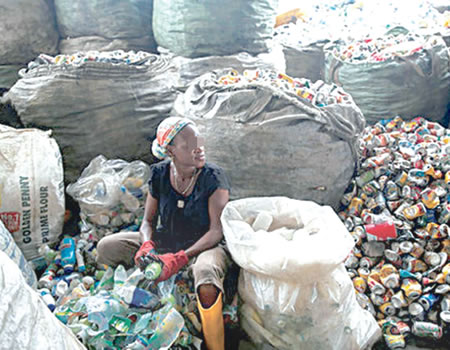The Federal government has signed the project document for sustainable plastic waste management in the Federal Capital Territory and Lagos state to promote Sustainable Plastic Value Chain through Circular Economy Practices.
Findings on Nigeria Waste Consumption level revealed that the country’s waste generation would drive her to be the world’s largest producer of waste globally, especially, as it does not have a deliberate plan of action to reverse the development.
More so that plastic waste has distorted water bodies because of its enduring nature when disposed of.
The survey commissioned by the government of Japan in 2021 showed that Nigeria Consumption has grown from 578,000MT to 1,250,000MT with a Per capita consumption grown from 4kg to 6.5kg while each citizen consumed 7.5kg which accounted for 13% of total solid waste.
The report also “ranked Nigeria as 9th country having coastlines generating mismanaged plastic waste and was predicted that by 2025, Nigeria will be the largest producer of mismanaged plastic waste in Africa.”
However, Ikeazor said the projects which would be executed by the United Nations Development Office (UNIDO), Nigeria government through the ministry of environment would help to reverse the situation and promote a new industry.
According to Ikeazor, “You may recall that the Government of Japan funded a study on available sustainable alternative materials for plastic innovative packaging and recycling technologies that meet market needs in Africa, to reduce plastic leakages to the environment, in Nigeria.
“The study which was conducted in the year 2021 was implemented by UNIDO in collaboration with the Ministry.
“Nigeria’s circular economy potentials can be seen in its large and thriving waste management sector that attracts operators due to the high volume of wastes and demand for recycled materials.
“One of the ways to realize this potential is to support the industry by demonstrating benefits of adopting circular economy practices with innovative technologies including recycling technology or alternative material production.
“This is exactly what this project whose objective is to promote the integration of circular economy principles and practices into plastic waste management, strengthen plastic value chains, demonstrate the benefits of adopting circular economy practices and resource-efficient production of plastic value chains in Nigeria, is designed to achieve.
“This project would therefore complement the efforts of our government in mainstreaming circular economy principles and practices into our National Development Plans.
“It is, therefore, my pleasure to sign the project document for the implementation of the project; “Promoting Sustainable Plastic Value Chain through Circular Economy Practices in the FCT and Lagos.”
His Excellency, Mr Mataunaga Kazuyoshi, Ambassador Extraordinary and Plenipotentiary of Japan to the Federal Republic of Nigeria pointed out that plastic waste is a major global environmental problem as its huge production has drastically increased by more than twenty-folds between 1964 and 2015, with an annual output of 322 million metric tonnes, which is expected to double by 2035 and quadruple by 2050 if no action is taken.
Kazuyoahi further added that mismanaged plastic waste mostly originating from land, is not only contaminating the land but is released to the marine environment, polluting it and threatening biodiversity balance while also negatively impacting the blue economy.
He stated that; “Mismanaged plastics and inadequate waste management is also a source of Green House Gas (GHG) emissions. According to the World Bank, plastic waste accounts for 12 per cent of the total amount of municipal solid waste generated globally in 2016 with only 9 per cent recycled and only 14 per cent collected for recycling.
Environmental expert at the United Nations Industrial Development Office UNIDO, Oluyomi Banjo, Environmental expert, who presented the survey findings, said effective implementation of plastic waste management, and plastic value chains are strengthened, especially recycling capacity, so that the number of plastics leaking to the environment will be reduced.
YOU SHOULD NOT MISS THESE HEADLINES FROM NIGERIAN TRIBUNE
We Have Not Had Water Supply In Months ― Abeokuta Residents
In spite of the huge investment in the water sector by the government and international organisations, water scarcity has grown to become a perennial nightmare for residents of Abeokuta, the Ogun State capital. This report x-rays the lives and experiences of residents in getting clean, potable and affordable water amidst the surge of COVID-19 cases in the state…FG commits Nigeria FG commits Nigeria
Selfies, video calls and Chinese documentaries: The things you’ll meet onboard Lagos-Ibadan train
The Lagos-Ibadan railway was inaugurated recently for a full paid operation by the Nigerian Railway Corporation after about a year of free test-run. Our reporter joined the train to and fro Lagos from Ibadan and tells his experience in this report…FG commits Nigeria FG commits Nigeria






